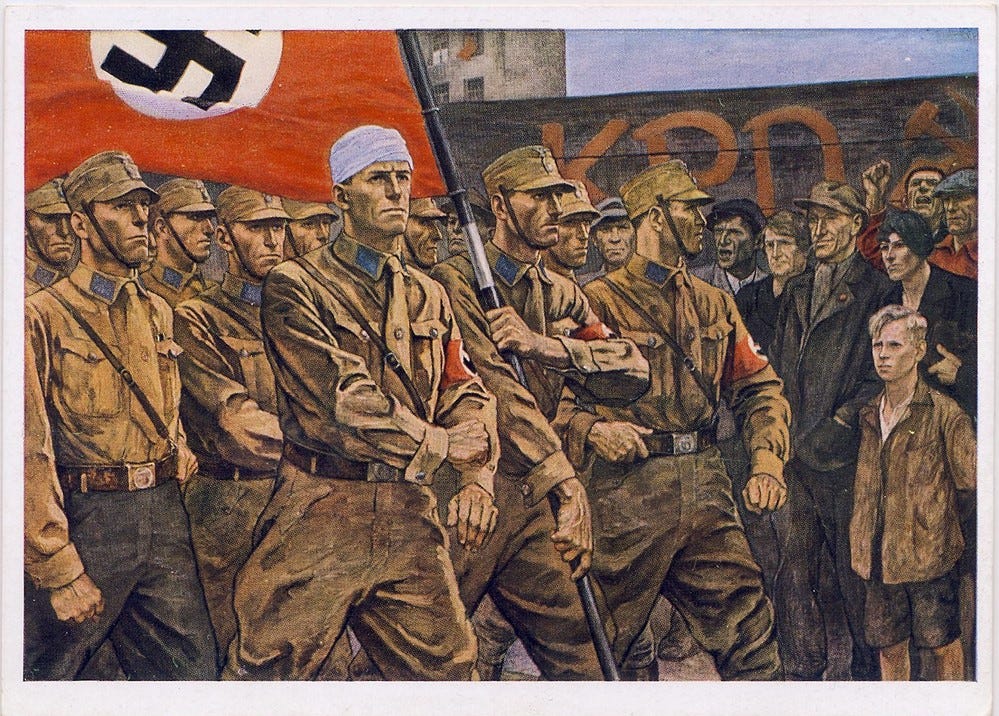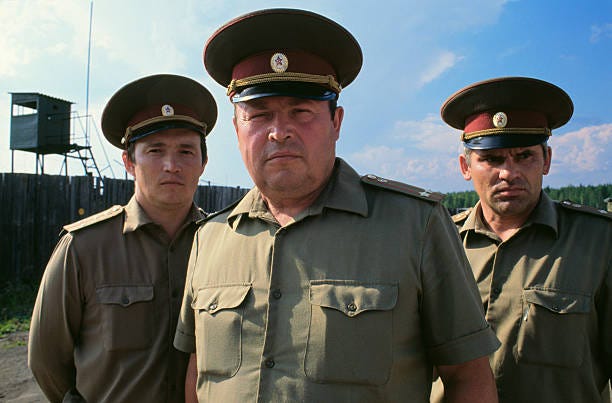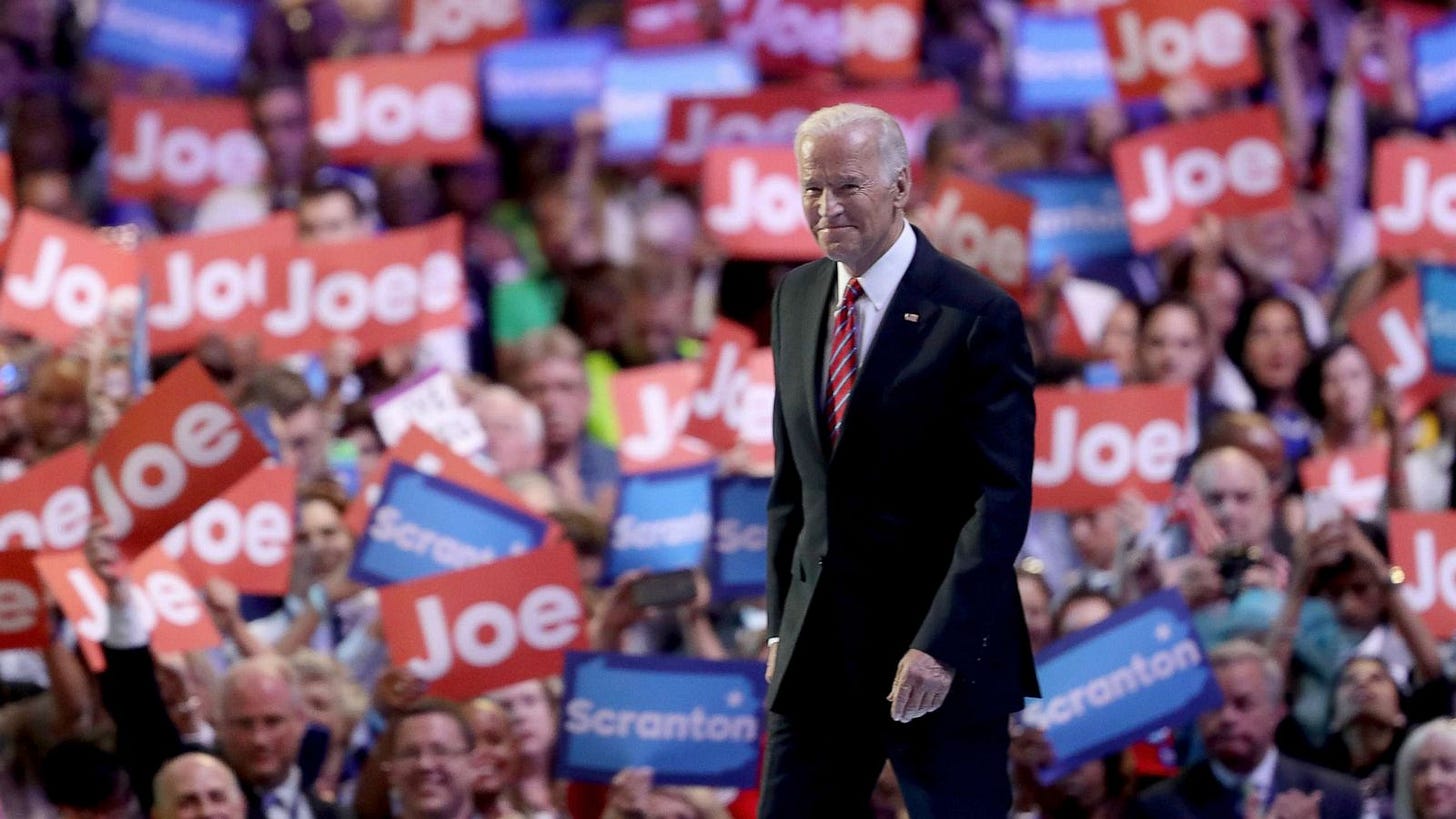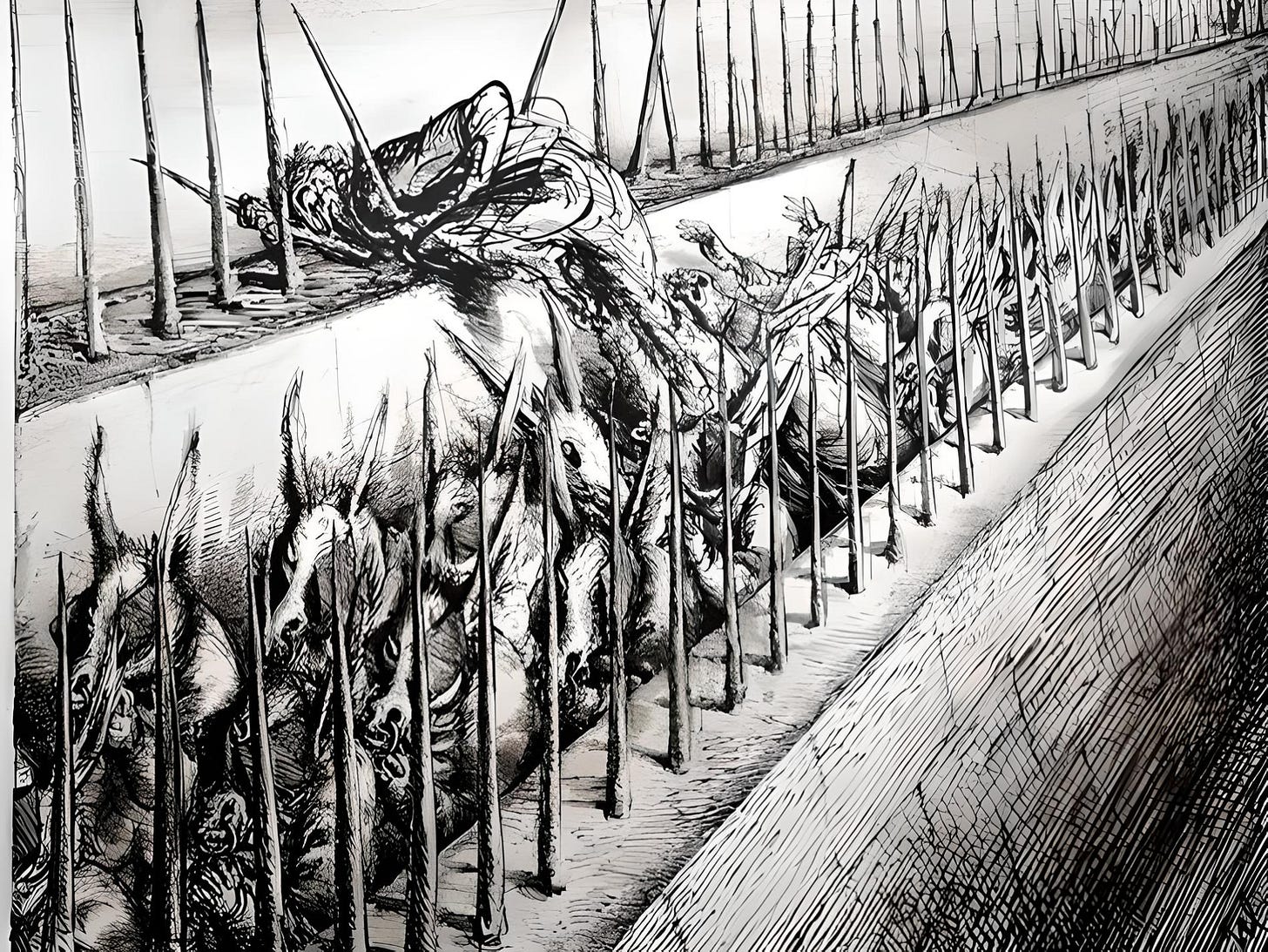Against All Totalitarianisms
by Michael Walker
Michael Walker argues that while liberalism is often viewed as the antithesis of totalitarianism, it is itself a totalitarian system that uses the individual’s “right to choose” to undermine the collective rights of peoples to choose their own paths, enforcing a singular worldview under the guise of “freedom”.
This essay was first published in The Scorpion, issue 10, autumn 1986.
We often hear totalitarianism condemned. Even those of the ‘extreme left’ or ‘extreme right’, whose programmes are totalitarian in the commonly accepted sense of the term, do all in their power to deny the charge. To be ‘totalitarian’ in politics is to be undemocratic, power-mad, inhuman, to be evil made flesh; but we are in danger of slipping into a futile syllogism when we talk about totalitarianism. It is this: “all totalitarian systems and ideologies are evil; all that is evil politically stems from totalitarianism; therefore totalitarianism is the term given to all manifestations of evil in politics.” Such reasoning helps no one to understand totalitarianism. The term becomes void of content, but a useful term of abuse against those who seek to organise a ‘revolutionary’ opposition to a given philosophical, scientific, economic or political system.
So far as totalitarianism is concerned, it is important to identify the phenomenon objectively, in terms of precise criteria, if we wish to be able to recognise it. It is a ‘form of polity’ (O.E.D.) which brooks no opposition, which seeks to occupy the totality of life of all, from cradle to grave. In order to achieve this totality it seeks to reduce all aspects of life and all variation in life to a single phenomenon, one total truth, immutable and which cannot be questioned. It is naturally easier to identify totalitarian systems from totalitarian thought. A thinker proposes and by doing so places himself in opposition to other thought. For the outside reader or listener it is easy to see two arguments or propositions as mere alternatives which can be evaluated in a way that by definition excludes a totalitarian perspective. Systems, the putting into effect of proposals, are more easily identified as seeking to become totally powerful and brooking no opposition. The power of a system enables totalitarianism to be realised. Where the power is obviously oppressive in a direct physical sense, shored up by secret police, death squads, executions without trial, torture, concentration camps, the political control of the judiciary and even the medical profession, then the ‘totalitarian’ nature of the regime becomes evident. Physical intimidation by the state, a sense of physical insecurity, induces the great majority to acknowledge the ‘truth’ which the government imposes. The logic of this is the silencing of the dissident.
Propagandists for systems which correspond to this kind of totalitarian ideology are anxious to disguise their ‘dark side’, although ever keen to expose the dark side of their ideological adversaries. The Soviet Union and national socialist Germany were both strongly influenced by their origins in a national resentment against defeat (“military betrayal”). A substantial military component in both the national socialist and Bolshevik revolutions, coupled with the religious nature of the two movements, ensured that they were ruthless and brutal once total power had been won. For the same reason, however, they were breeding grounds of human qualities as well as defects. To quote Michael Power, the national socialist regime was responsible for many superb achievements but also many unforgivable things. It is proof of the lack of a spirit of enquiry in the liberal consensus of the day that only the negative aspects of national socialism are recognised. Like Marxism and national socialism, but with less honesty than either, liberalism also has its myths and irrational dogmas. It too seeks to reduce the history of the world to one point: in this case the struggle of the individual to express himself as freely as possible.

Characteristic of all totalitarian or totalitarian-inclined systems is the contrast between the heroes of the struggle which precedes power and the meanness and destructiveness which characterises the aftermath. Because totalitarian ideologies contain a religious impulse they inspire heroism, integrity and sacrifice, as well as cruelty and hypocrisy; but liberalism, Marxism and national socialism have always been unwilling to admit to courage or virtue in champions of opposing creeds, preferring to label them as agents of an enemy and not human beings at all. Liberals who condemn what they piously deride as “left and right-wing extremism” are no different in this respect. The champions of each ideology are also wont to mark down all opposing systems as essentially akin. Marxist theory, for example, interprets all manifestations of fascism as “capitalism with its back to the wall”. According to liberals, the far right and far left are essentially the same, while national socialists and fascists claim that liberalism is the mother of communism. Seen through the requisite ideological glasses, each of these assertions is essentially true, for the totalitarian mind knows only one world of my truth and their ignorance, of this good and that evil.
According to the dogmas of the Western world, totalitarianism is characterised by its disregard for individual human rights (the right to security and happiness) but a monumental disregard for such rights is a feature of only certain kinds of totalitarian systems and is not what defines them as such. The totalitarian system is the one which acknowledges only one god, one truth, one way of life, one manifestation of good and evil. A non-totalitarian religion acknowledges many gods and non-totalitarian politics acknowledges the rights of other peoples to be different, of other systems to exist and to be right too in their own way.
The liberal interpretation of totalitarianism must therefore be treated with caution. It is true that the ideologies which liberalism accuses of being ‘extreme’ and ‘totalitarian’ are notoriously intolerant of dissidents and notoriously ready to employ terror and brutality, deceit and coercion of every kind in order to achieve their ‘holy’ end. That is not in question. What should be questioned is whether liberalism itself is inherently non-totalitarian only because it does not (as a rule) employ the methods of the ideologies and systems which it identifies as totalitarian. In essence, totalitarianism has nothing to do with method: it is a system which seeks to embrace the totality of existence. In political terms, the totalitarian creed seeks to reduce all political phenomena to manifestations of the veracity of the creed. To speak in religious terms, political ideology interprets all political events as political revelation. Ideology is secular religion and we use the term ‘totalitarian’ to describe the religions and secular religions that mould the entirety of history to their way of thinking, covet all things on this earth and will “fathom all her quicksands”.
Marxism is a religion. national socialism is a religion. In twentieth-century Europe, where Christianity has declined with a rapidity that few thinkers (with the notable exception of Nietzsche) had foreseen, these two doctrines of destiny and revelation were tailor-made for peoples craving new religious impulse. The Christian echoes in both doctrines are striking. Both believe in the destiny of a chosen people (the “White race”, “the proletariat”) to establish paradise on earth. God is not in heaven, nor is heaven in the skies. God and earth can be fashioned through the triumph of the forces of good (the “White race”, “the proletariat”) against the forces of evil (“the Jews”, “the ruling classes”). To extirpate our ‘original sin’ (“race mixing”, “division of labour”) we are obliged to pass through a ‘purgatory’ in order to reach paradise (“total war”, “dictatorship of the proletariat”). Both doctrines have prophets (Darwin, Marx) and their messiahs (Hitler, Lenin), their heretics (Strasser, Trotsky) and ‘their chosen land’ (Germany, Russia). From the veneration of the Führer to the daily crowds who enter the queue to Lenin’s mausoleum in Red Square, the two great ideologies of the twentieth century have shown themselves to be secular religions, demanding faith beyond reason, a burning faith even unto death, a rejection of material comfort in the cause of the spirit and truth, the burning optimism that one day One Truth will triumph and the enemies of Righteousness will perish utterly. Woe to those who dare contradict the doctrines of the Church turned State. Woe unto those who seek to interpret scripture independently. Strasser was a “tool of Jewry”, Trotsky a “C.I.A. agent”, just as Luther had once been the “Devil’s disciple”.
The total defeat of national socialism in 1945 left liberalism as the only coherent political ideology in the world opposed to Marxism. Traditionally, liberalism has always been hostile to established religions. Its loathing of national socialism and Marxism is a continuation of its anti-religious raison d’etre. For many liberal commentators, ‘totalitarian’ and ‘religious’ mean much the same in a political context. The liberal creed preaches the autonomy of the individual and is therefore inherently hostile to the religious and secular religious systems. In the name of the individual it will seek to destroy any such system. The most despised religion for the liberal is always national socialism and not communism, because whereas communism, in principle at least, claims to work for the emancipation of the individual, the national socialist admits to no time in the future when the individual can ever become emancipated from the doctrines of racial imperatives. From these facts it comes that the liberal defends communist “intentions” but condemns the “methods”, whilst national socialism and fascism (seen as its ultra-conservative collaborator) are condemned out of court.

There is reason to believe that a world state based on the principles of democratic liberalism may one day succeed in achieving supreme global power. Rationally, liberalism as a creed is compelled to develop its political and economic strength further and further, eliminating all systems and religions (secular or otherwise) which stand in its way. All the time the way of life which places the individual above all things is championed as the anti-totalitarian force, the force which is fighting the new “evils” of “poverty and ignorance”. Liberalism doesn’t believe in messiahs, and everyone may interpret events as he pleases (we are all free), yet the system is essentially the same. The emancipation of the individual from harm and struggle, from want and anxiety, constitutes the end of history, and all events in the political world are political revelation of the struggle between the individual yearning to be free and content, and the ignorant, ambitious and greedy. In principle, Marxists, liberals, all totalitarians, seek to one day (an unspecified and ever-receding day in the future) abolish politics. Politics is seen as belonging to the infancy of man. For both the Marxist and the liberal, economics are better equipped to emancipate the individual. Political struggle is the regrettable consequence of our fallen state. Here there is a distinction to be made with national socialism, which shares with the theistic (as opposed to secular) religions a belief in the spiritual essence of the struggle. This point can be exaggerated, however, for the strong current of biological determinism in national socialist thought brings it closer to the materialism of communism and liberalism than is sometimes admitted.

Caution should undoubtedly be used when we employ the term liberalism. In the first place it is commonly used in the United States to depict all doctrines and creeds which are suspicious of authoritarianism or even just the religious content of American values. When an American uses the term ‘liberal’ he can be referring to any kind of free thinker, left-winger or even just a non-reactionary. In France, the term often refers to the proponents of a free market economy, according to which definition Margaret Thatcher is a leading champion of liberalism, more so than any social democrat. When we use the term liberalism in a derogatory sense, we are referring to a specific kind: the anti-creed of the modern world. Christopher Lasch, in The Culture of Narcissism, argues that contemporary American society, and by extension the Western world, has created what he calls a “narcissistic sensibility”. It is this sensibility which seeks to impose itself upon the entire world, indeed which is succeeding in doing so. There exists, in other words, a totalitarian liberalism. If this expression appears to be an oxymoron, it goes to show how far we have been trained to dissociate liberalism from any whiff of totalitarianism. Our criteria for judging what is totalitarian (extreme ideas, concentration camps, secret police, the cult of masculinity, the veneration of the state) are, as though by chance, the criteria which nicely exclude all probable liberal methods of exercising power.
Christopher Lasch in the United States and Claude Alzon in France have both written books in which they deplore the decline of educational standards in their countries. They identify various progressivist educational methods as the source of the problem but unlike conservative commentators point the finger of blame for this not at left-wing or even liberal bias. For Lasch and Alazon, consumer society actually requires a lower general standard of education than has previously existed. If, as Ellen Wood wrote in The Mind and Politics, “a conscious or unconscious conception of human nature underlies every choice of social or political values”, then the conception of the self-expressive individual, one free from collective responsibility of any kind, underlies permissiveness in education. According to Lasch, modern American society needs a large number of consumers trained only in a specialist field. A sound general education is a hindrance and not a help. The system organises an educative method which induces what Lasch calls a “mindless eclecticism” adapted for a mobile, rootless, alienating capitalist society. Lasch’s analysis is applicable to a greater or lesser extent to the entire Western world. Extremism, we are told, is kept out of our classrooms, or should be. Even politics should be kept out of classrooms. The pupil is thus prepared for his amalgamation into mass society. Supremely boring, modern education prepares its subjects for a life of boredom in which neither commitment nor resistance can be relevant concepts. Where nothing is proposed, nothing can be opposed. The characteristic of the modern method is imprecision, and the results are obvious. If Marxism and national socialism distort the meaning of words, liberal totalitarianism obscures them. Worse, knowledge is reduced to a quantity of disconnected assets. Concentration, endurance, tenacity, reliability are bred out of us by a system which depends on our being in perpetual motion, where neither landscape nor people can keep still, where nothing we know is permitted to endure lest we become attached. School is to be endured just as life will be endured, without enthusiasm or hostility, like a tasteless meal.

The essence of the modern system, and where it contrasts sharply with religious or secular religious systems, is to exclude the individual from communal participation, from active involvement in more than a part of the workings of society. As Friedrich Jünger argued in The Failure of Technology, the rights of the individual in modern society have become the rights of the technically organised individual. The university becomes a technical training centre for the largest number of people possible. They all have a “right” to education and a job but not a right to belong to a movement of ideas, to be integrated into an effective community. Modern society underlines the importance of consumption at the expense of participation. The amateur is frowned upon. More and more the activities of the community belong exclusively to experts: from sports to politics, from dramatics to money-making, the independent activist is treated with suspicion and hemmed in by restrictions, while all the time the independent consumer is pandered to and flattered.
Totalitarianisms seek to limit all expression to an expression of the one truth: racial awareness, class solidarity, individual self-expression. Individual self-expression means, of course, mass expression, the expressions created for the mass by the media, the expressions which reduce all politics into a ‘show’, a professional show, in which the spectators are the mass and the performers are the chosen priests of the system. Tennis at Wimbledon, Mastermind, Trivial Pursuit (aptly named), the Guinness Book of Records, examples of technical perfection, self-fulfillment without purpose, without value beyond itself. Even darts becomes big business and one more media attraction, one more way of creating a mass at the expense of a community. Our desire is everything. Our will is nothing. This is the “non-totalitarian” system. This is the rule of Narcissus.
Opponents of the cult of Narcissus are neither suppressed nor censored. They do not need to be. They become part of the entertainment too, reduced to a definable social phenomenon. How can they become successful except by way of the very self-indulgent criticism which is the hallmark of the system they claim to oppose? Those who adopt one or other of the prevalent ideologies of the earlier part of the century become street-corner clowns, where the streets are only inhabited by those sectors of mass society least able to appreciate a revolutionary message. Populist doctrines which make headway at the level of street politics will by their very nature be made to seem ridiculous under the camera lights. Abandon street politics and the non-conformist becomes ipso facto a member of the established system, working within a group to have his book published, his article published, something impossible so far as established publishing houses are concerned, to a man who has not worked out his career, who has not already become another individual struggling for recognition in his specialist field. Bureaucracy transforms collective grievances into personal problems amenable to therapeutic intervention. Opposition becomes a technical problem, a failure to communicate. Technical progress and massification go hand in hand — throughout the world. This arm of the international system is intolerant of lifestyles, of collectivities, which it cannot absorb.

The individual, in whose cause freedom from authority is supposed to be effected, is not made freer in the true sense of the word because his emancipation takes place in a world in which his opportunities are increasingly circumscribed. As Guillaume Faye noted in his review of Lasch’s work: “deprived of the ability to exercise self-discipline, the individual runs against the socio-economic interdicts, which he discovers when he reaches adulthood: bureaucratic regimentation, the power of the banks, commercial constraints ... what else has he to do, when nothing more aligns him with others, than become enthralled by himself?”
The current denunciation of “totalitarianism” and the catchphrase “free society” must be seen in the context of the interests of the system which produces such slogans. By “totalitarianism” it means specifically religious or political totalitarian systems, those, in other words, which work by physical coercion. The free society is the society which best safeguards the system of the autonomous individual. The interests of the autonomous individual are in the hands of the managers and representatives who seek to ensure that progress and development function evenly. The strength of this system is that it functions everywhere and nowhere. Individuals, limited to their function and battling for more leisure and better ‘value for money’ from what they consume, can only exercise power within the constraints imposed by their particular speciality. With impeccable logic, the expanding leisure industry reduces the world to a leisure centre complex. All the peoples and nations of the world are subject to the same rhythm of growth. Growth and development are the key words to ‘improvement’ in the liberal sense. The human individual is turned into an amoeba, a unit which consumes.
This system is totalitarian. It represents an economic totalitarianism, denying communities and even nations the chance to become self-sufficient. Budget deficits are made good by mass tourism, which accelerates the process of decomposition of environment and communities, in the unanswerable cause of ‘improving the standard of living’. The quality of life is only understood in terms of the quantity of assets, but happiness is as elusive as ever. The post-war age is characterised by an overriding sense of anxiety: anxiety about the Bomb, about the environment, world hunger: we live in a system which follows the vicissitudes of a graph and our fate is determined not by the seasons nor the natural rhythm of life but by money and the moving of assets, the balance between the honest and the dishonest, the successful investment and the less successful one. Incapable of drawing inspiration from the past, Western man is not ambitious for the future. His plans for the future take the form of a desperate search for security. He is indebted to the system. He lives beyond his means and pays off his debts, his mortgage, his credit cards, the interest on his loans, for most of his life — unless he is one of the fortunate ones who makes ‘a break’ and lifts himself into the higher income bracket, where he has money enough to assure himself complete financial security, for after all there is not so much that money can buy nowadays beyond total comfort and security. The rest of us live ‘beyond our means’ by enjoying the perks and fringe benefits which our specialist employment offers us. The pious exclamations of horror with which spokesmen greet high unemployment figures is the horror of seeing a number of people out of even the illusion of being useful members of society, of enjoying the perks and fringe benefits which go with the jobs that exist.
Banned books are seldom officially banned in the West: they are just deprived of their impact or ‘not generally available’.
Whatever its manifest and manifold failings, the Western way of life will always insist on its inherent superiority. Those who ‘enjoy’ it are told how lucky they are and appeals are constantly being made to their feeling of responsibility to the two-thirds of the world which are, we are always told, starving, because we in the West enjoy ourselves too much. The purpose of this propaganda is less to induce a feeling of guilt as to persuade us “fortunate rich” that our system is supremely desirable and that complaints are churlish. Our happiness is proven by statistics. The problems of the Third World are always shown to be “economic and political” by which it is meant that politics is an unwelcome intruder and that economically the Third World has not become fully integrated into the Western system.
The Western system tolerates many manifestations of freedom of expression that in “totalitarian” systems would not be tolerated (eccentric dress, swingeing criticism of the government of the day and its leaders, demonstrations, strikes and sit-ins) because such freedom of expression is the very essence of the consumer society of the West. These freedoms, however, are part of Western media show business. Real power is elsewhere: less and less in the hands of powerful individuals and increasingly working through corporations and institutions. In a system where the will of the mass determines the kind of society we live in, power resides in the forces which can manipulate the masses. It is the argument of ‘anti-totalitarian’ liberal writers that the one-party state, apart from its physical coercion, differs from a ‘free society’ in denying the individual a role apart from the state, but under the Western system the state is replaced by society, mass society. In mass society there is also no room to be different. Information outside the mainstream of ideas is not banned. It is allowed to take its place in open competition with the voice of the establishment: the mass media, being made for and by mass society, are inevitably going to outpace what appeals to an elite. Only the elite of specialists can be permitted to find a niche. The Western world is a mass society managed by technocrats. Opposition is not suppressed: it is made non-viable, non-relevant, inoperative.
Our mass society is therefore not so far distant from the mass society of Hitler’s Germany or Stalin’s Russia as it likes to pretend. It exceeds both in hypocrisy. Stalin created an index of banned books in the Soviet Union. Goebbels organised a public burning of pornography and “subversive literature”. In the West, the very notion of subversiveness or being disapproved of by the government is made into an extra enticement to buy, worked into the system, deprived of its power to change, transformed into business. Where suppression of ideas is necessary, and it seldom is, a piece of writing or a publication will become commercially non-viable or likely to pose a threat to the security of part of the population, or stir up hatred, and for that reason can be quietly removed without fuss. Banned books are seldom officially banned in the West: they are just deprived of their impact or ‘not generally available’. Alternative ideas may be presented to any one scheme or project but nothing can hinder the momentum of the Western world itself.
The champions of freedom of choice are destroying freedom of choice. The individual’s right to choose is being used to undermine the rights of peoples to choose. Freedom of choice operates where there exist different systems and different ways of life in the world. A sense of history and destiny is never far from the collective conscience of a people. A sense of being different and the respect of the difference of others is the mark of a genuine non-totalitarian liberalism. An appreciation of the variety of the world on the part of those who wish to change it requires the nurturing of intelligence and what is so difficult to maintain in the modern world: tenacity. The expectation of achieving ‘quick results’ and the notion of ‘time running out’ on the part of those who seek to reaffirm the identity of their people is, ironically, a typical psychological characteristic of the Western way of life. Personal unreliability is equally the hallmark of nearly all of us, brought up in the condition of dependency. The commitment to a non-Western way of life is marked by a commitment to becoming involved, whether in politics or personal relationships, at work or in public life, never accepting the ‘least line of resistance’. To accept the fait accompli of social organisation or decision-making handed down to one as if from above is to accept that state of passivity and compliance which is typical of the individual in mass society. The totalitarian temptation is always the same: the easy way out. The free man is a fighter.




Good to read an early Walker piece again. I subscribed to The Scorpion many years ago, and I'm sure I have my old magazines in a box somewhere in my basement. I'm impressed to be reminded of Walker's prescience four decades ago, along with his allusions to the insights of Lasch and Junger. I'm feeling the desire to clean my basement (my wife would be relieved) to locate my issues of The Scorpion.